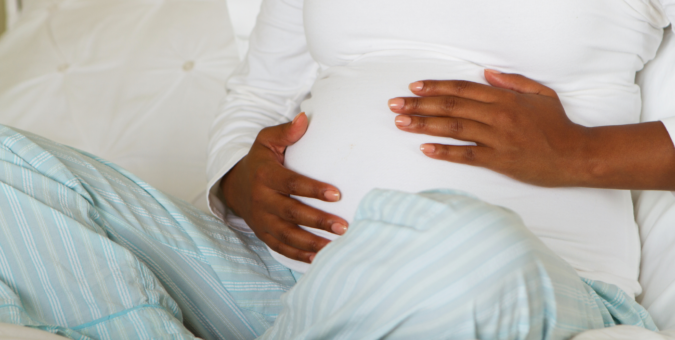
On 24 May 2022, Helena Henderson and I attended the launch of the Black Maternity Experiences Report, which features research carried out by the organisation Five X More. It was a really inspirational event – full of energy and motivation to make a difference. Unfortunately, there was a much more sombre reason for the report and launch.
What is Five X More?
Five X More is a grassroots organisation which was started by Tinuke Awe and Clotilde Abe in 2019 as a response to the 2018 MBRRACE-UK (the collaboration appointed to run the maternal, newborn and infant clinical outcomes review) report which identified Black women were five times more like to die in pregnancy and childbirth than White women.
The statistics in the 2020 MBRRACE-UK report showed that Black women in the UK are still four times more likely to die in pregnancy than White women. They are also twice as likely to suffer severe pregnancy complications or suffer a stillbirth or neonatal death compared to White women. Despite these facts, the cause remains unclear.
In 2021 Black Maternal Healthcare and Mortality was debated in Parliament. There was a call for evidence to understand women’s experiences. However, it was revealed that women from Black and other minority ethnic groups were underrepresented in the responses. Tinuke and Clotilde sought to rectify this, to give Black women a voice, and an opportunity for their experiences to change the narrative and push to improve patient safety in the future.
What is the Black Maternity Experiences Report?
Five X More set up a nationwide campaign in 2021 to collate the maternity experiences of Black women in the UK. The survey asked Black women who had been pregnant between 2016 – 2021 to describe their experience on their maternity care The survey received an incredible 500 responses within the first 24 hours, with over 1300 being received in total. This was the largest survey in the UK to have explored the maternity experiences of Black and women exclusively.
Whilst there were both positive and negative experiences reported, disappointingly the negative far outweighed the positive.
The report provides the following alarming information:
- 54% of women reported facing challenges with healthcare professionals during their maternity care
- 43% reported feeling discriminated against during maternity care with the most common reasons being race, ethnicity, age and class.
- 43% reported that their pain relief options were not explained to them and 52% of women who did not receive their choice of pain relief did not receive an explanation
- 42% felt the standard of care they received during childbirth was ‘poor’ or ‘very poor’
- 42% felt that their safety had been put at risk by professionals during labour or the recovery period.
The negative experiences reported in the survey were found to fit into three categories:
Attitudes of healthcare providers (including use of offensive and racially discriminatory language):
- The attitude was frequently described as dismissiveness with reports of genuine concerns being ignored or trivialised by professionals. Concerns being ignored were felt to have led to emergency situations for some.
- There were reports of healthcare practitioners displaying attitudes which were belittling or patronising and little empathy was shown during a time when they were feeling their most vulnerable.
- One Black woman described being treated with more courtesy when attending appointments with her husband who was white than when she attended alone.
Knowledge (including poor understanding of how clinical conditions present in babies of Black women):
- There was clear evidence of inaccurate knowledge about the anatomy and physiology of Black and Black mixed women and how this impacted pregnancy.
- One woman was told by a midwife when doing the sweep that the reason for dilation taken so long was “probably due to an African pelvis.”
- There were also reports of failure to accurately record ethnicity resulting in tests for sickle cell not being carried out.
Assumptions (including racially based assumptions about pain tolerance, education level and relationship status of black women):
- Many women were faced with situations where it was insinuated that they should be able to manage their pain. These comments were mostly made during the labour period with perceived strength often being a way to justify refusal of pain relief.
- One woman felt she was expected to endure pain beyond a level that she was comfortable with as she was “big and strong so no need to worry.” Black women described cases where assumptions were made about their immigration status and educational levels with comments such as “this is not how we do things over here” being made.
Many women described feeling traumatised by their experiences with a number of women feeling fearful of having more children.
The report highlights the work that must be done to achieve equality in maternity care for all women regardless of their ethnic background:
- Conduct an annual maternity survey targeted specifically at Black women to capture the experiences to highlight positive experiences and key area for improvement.
- Increased knowledge on identifying and diagnosing conditions that are specific to and disproportionality affect black women. Health care practitioners should have training and information on specific conditions that are more commonly seen in Black women for example sickle cell anaemia, pre-eclampsia, gestational diabetes and dietary advice specific to Black culture. There should be increased diversity in medical illustrations and textbooks which should accurate diagnosis of conditions in darker skin to help improve patient safety.
- Improve the quality of the ethnic coding in health records
- More community-based approaches must be used to improve maternal outcomes
- An improved system for women to submit their feedback and/or complaints specifically for maternity, data on ethnicity needs to be added to all complaints to better capture who is complaining. To understand women’s feedback in real time, an independent agency must be put in place to contact all women up to 6 months after giving birth to ask them of their experiences and rate care given
- Ensure that individual involved in training health care professionals are aware and have an appreciation of the disparities in maternity outcomes.
My thoughts on the report
Behind every statistic is a person, a family and a potentially traumatising experience. Every baby or mother that dies leaves behind a heartbroken family, and every person that suffers a severe pregnancy complication or a ‘near miss’ will live with that trauma for the rest of their lives. Lessons need to be learned and changes implemented based on the experiences which have been shared.
It was heart-breaking to hear so many experiences of personal suffering at the launch. Their courage in speaking out and reliving such traumatic events was truly humbling. The same theme ran through most experiences: ‘I was not listened to…my voice was not heard’. This is simply not acceptable.
We need to ensure there is equality within our maternity services. Each and every woman needs to feel safe and heard.

















